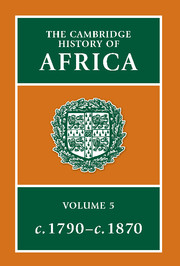Book contents
- Frontmatter
- Introduction
- 1 Egypt and the Nile Valley
- 2 Ethiopia and the Horn
- 3 The Maghrib
- 4 The nineteenth-century jihads in West Africa
- 5 Freed slave colonies in West Africa
- 6 West Africa in the anti-slave trade era
- 7 The forest and the savanna of Central Africa
- 8 East Africa: the expansion of commerce
- 9 The Nguni outburst
- 10 Colonial South Africa and its frontiers
- 11 Tradition and change in Madagascar, 1790–1870
- 12 Africans overseas, 1790–1870
- 13 Changing European attitudes to Africa
- Bibliographical Essays
- Bibliography
- Index
Introduction
Published online by Cambridge University Press: 28 March 2008
- Frontmatter
- Introduction
- 1 Egypt and the Nile Valley
- 2 Ethiopia and the Horn
- 3 The Maghrib
- 4 The nineteenth-century jihads in West Africa
- 5 Freed slave colonies in West Africa
- 6 West Africa in the anti-slave trade era
- 7 The forest and the savanna of Central Africa
- 8 East Africa: the expansion of commerce
- 9 The Nguni outburst
- 10 Colonial South Africa and its frontiers
- 11 Tradition and change in Madagascar, 1790–1870
- 12 Africans overseas, 1790–1870
- 13 Changing European attitudes to Africa
- Bibliographical Essays
- Bibliography
- Index
Summary
This volume is concerned with a period of African history which has traditionally been defined by events emanating from Europe. The year 1790 roughly marks the beginnings of the effective impact of the British anti-slavery movement on West Africa, where the freed slave colony of Sierra Leone was already struggling to establish itself. Protestant missionary enterprise in West and South Africa had begun. In 1795 the British first occupied the Cape of Good Hope, while three years later Napoleon's occupation of Egypt launched the movement of ‘modernization’ in North Africa. In succeeding decades the impact of European traders, missionaries and consuls increasingly began to affect the internal social, political and economic balances within African societies. The choice of 1870 as the terminal date for this volume is obviously dictated by the beginnings of the European scramble for African territory which will be a major theme of volume 6. The period can thus be considered as one dominated by the theme of Africa's growing contact with Europe, as a time of slow penetration and preparation by Europeans for the coming of partition and colonial rule.
Such a perspective, however, offers a somewhat irrelevant pattern for the history of the continent as a whole. Though Bantu in South Africa, or Arabs in Algeria, felt the direct impact of European settler colonization, elsewhere in the continent the vast mass of Africans rarely saw a European, and Europe influenced their lives only indirectly or at second-hand, except for those who lived in coastal areas where there was a direct European presence.
- Type
- Chapter
- Information
- The Cambridge History of Africa , pp. 1 - 12Publisher: Cambridge University PressPrint publication year: 1977

